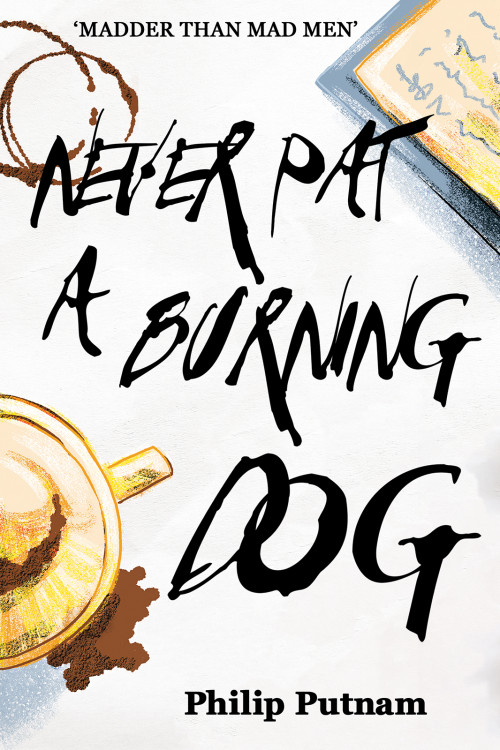
By: Philip Putnam
Never Pat a Burning Dog
Book Format: Choose an option
Free standard delivery on UK orders over £35
*Available directly from our distributors, click the Available On tab below

By: Philip Putnam
Book Format: Choose an option
Free standard delivery on UK orders over £35
*Available directly from our distributors, click the Available On tab below

Philip Putnam spent school holidays toiling in London’s second filthiest factory and controlling the valves in the Walthamstow Sewage Treatment Works. Perfect preparation for a long career as an advertising copywriter and creative director.
It always bothers me when copywriters abbreviate their job title to simply ‘writer’. To call yourself a writer it seems to me that you must be able to hold an audience’s attention for longer than a few seconds, and to do so without the trainer wheels of pictures and music. Smarter agency creatives intuit this; that the skills needed to create an effective ad, even an award-winning long copy ad (remember them?), are not the same as those required to write a publishable magazine article, let alone a readable novel. There are, of course, people who’ve done both. Peter Carey was impressing industry awards panels long before he became a Booker laureate and Salman Rushdie was winning prizes with slogans like ‘Irresistibubble’ for Aero and ‘That’ll do nicely’ for American Express long before he was awarded a fatwah. Bryce Courtney, who’s first novel sold more than Carey’s or Rushdie’s, doesn’t belong in this category because (dare I say it) he wasn’t a particularly good copywriter. Ditto James Patterson, who, prior to becoming one of the biggest-selling American authors of all time, wasn’t even the best copywriter in the New York offices of J. Walter Thompson. But these are the exceptions who prove the rule. Most agency creatives who get the urge to become a real writer learn very quickly (after, say, six pages of A4 and half a case of merlot) that Gore Vidal was right to observe that while it may be true that everybody has a book in them, “most people should leave it there”. I’m glad Philip Putnam, a better copywriter than any of the above, ignored that advice. Never pat a burning dog is by no means the first novel set in London’s adland, but it’s the first one set in a 1980s Soho which I, a by-product of that brilliant booze-fuelled demi-monde, actually recognise. Not just the idea-cracking long lunches, but the long-suffering restaurants which hosted them. Not just the incessant skirt-chasing, but the cut of skirt which demanded to be chased. Not just the drinking of beer, but the actual pubs where it was drunk – and where I still drink when I go back there today – albeit in much smaller quantities, and without the obligatory cigarette in hand. All of which may sound like a ringing endorsement of the ‘Madder then Mad Men’ cover blurb. But I think that encomium - transparent pitch as it is to the more tabloid-minded, titillation-seeking reader – does not do Mr Putnam’s novelist chops justice. Because this is much more than a hangover-inducing 350-page immersion in the debauchery and indulgence which characterised what has been described as the golden age of British advertising. Unlike even the longest-form content, for example, it has distinctive, believable characters, with distinctive, believable back stories - and even distinctive, believable regional accents. Which last point is important because, being a novel made up mostly of dialogue, this is one you listen to more than read. Putnam’s narrative technique is not to woo you with descriptions of a bygone era. It is rather to give you a passive presence in the proceedings akin to that of the junior suit or planner who is invited to the pub or restaurant so that the bill can be put on a job number; you can laugh at the banter without the pressure of having to contribute to it. And laugh you will – if you haven’t had the humorectomy which has determined the recruitment policies of so many big agency networks in the #Metoo, DEI era – and which has so emasculated and homogenised their output. You’ll even laugh if, having worked in at least one of the agencies where Mr Putnam has worked, when he was working there, you suspect you might have been in the room/pub/restaurant when some of those jokes were first cracked. But that doesn’t detract from the fun. Like the fine wine which we all guzzled so unappreciatively at the time, the best of those jokes only improve with age. Indeed, if copywriters can be said to have any advantage over say, accountants, plumbers or taxi drivers when it comes to the business of novel writing, it is that in the course of their real day jobs they collect more material which can be repurposed as fiction. I know whereof I speak, here, having extrapolated one of my own novels from a rejected Kit Kat script. But there is nothing Kit-Katty about Philip Putnam’s fictional debut. Which is to say that at no point did I feel the need to have a break from it. Which is also to say that unlike the canine of the title (whose provenance is well worth waiting for) it is a perfectly healthy dog: you can’t put it down. Boom, boom. Cut to pack shot.
We use cookies on this site to enhance your user experience and for marketing purposes.
By clicking any link on this page you are giving your consent for us to set cookies